1997 Honda Accord, a name synonymous with reliability and practicality, carved its place in automotive history. This mid-size sedan, released during a pivotal era in the car industry, offered a compelling blend of comfort, performance, and fuel efficiency, quickly becoming a favorite among families and commuters alike.
Its sleek design, spacious interior, and powerful yet economical engine options made it a standout choice in a crowded market, solidifying its position as a reliable and desirable vehicle.
The 1997 Honda Accord’s legacy extends beyond its impressive sales figures. It embodied a shift in consumer preferences, emphasizing value and dependability over flashy aesthetics. This focus on practicality and longevity resonated with a generation seeking a car that could navigate the demands of everyday life without sacrificing comfort or performance.
The Accord’s enduring popularity, evident in its continued presence on roads even decades later, speaks volumes about its enduring appeal and lasting impact.
Overview
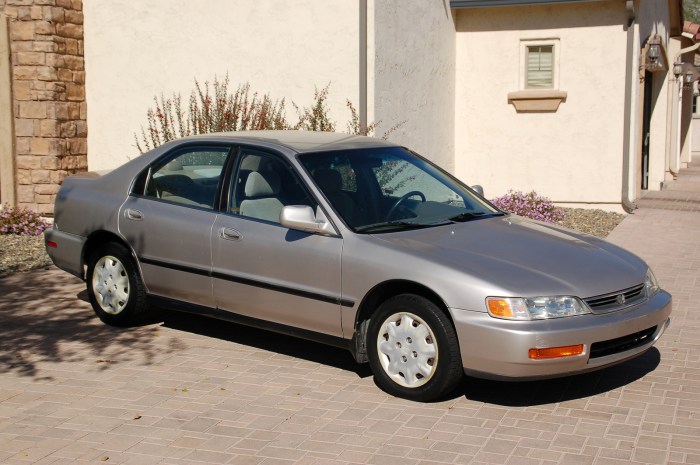
The 1997 Honda Accord, a mid-size sedan, was a significant player in the automotive market, solidifying Honda’s reputation for reliability, fuel efficiency, and driving comfort. It was a popular choice for families and individuals alike, known for its spacious interior, comfortable ride, and dependable performance.
The 1997 Honda Accord was available in both a 4-door sedan and a 2-door coupe body style. It offered a range of engine options, including a 2.2-liter four-cylinder engine and a 2.3-liter VTEC four-cylinder engine. The Accord’s design was sleek and modern, with a focus on aerodynamics and practicality.
Key Features and Specifications
The 1997 Honda Accord featured a range of standard and optional features that contributed to its popularity.
- Engine Options:The 1997 Honda Accord was available with two engine options: a 2.2-liter four-cylinder engine producing 130 horsepower and a 2.3-liter VTEC four-cylinder engine producing 150 horsepower. Both engines were known for their smooth operation and fuel efficiency.
- Transmission:The Accord came standard with a 5-speed manual transmission, with a 4-speed automatic transmission available as an option.
- Suspension:The 1997 Honda Accord featured a MacPherson strut front suspension and a double wishbone rear suspension, which provided a comfortable and controlled ride.
- Safety Features:The Accord was equipped with standard safety features such as dual front airbags, anti-lock brakes (ABS), and a driver’s side airbag.
- Interior Features:The 1997 Honda Accord offered a spacious and comfortable interior with ample legroom and headroom for both front and rear passengers. The interior was well-appointed, with features such as power windows, power locks, and air conditioning.
Design and Styling
The 1997 Honda Accord was designed with a focus on both practicality and aesthetics. Its sleek lines and aerodynamic shape were designed to improve fuel efficiency and enhance its visual appeal. The Accord’s front grille featured a distinctive Honda design, with a large chrome bar and a prominent Honda emblem.
The headlights were integrated into the front fenders, giving the Accord a clean and modern look. The Accord’s interior was also well-designed, with a focus on functionality and comfort. The dashboard was laid out in a user-friendly manner, with easy-to-reach controls.
The seats were comfortable and supportive, and the interior materials were of high quality.
Performance and Handling: 1997 Honda Accord
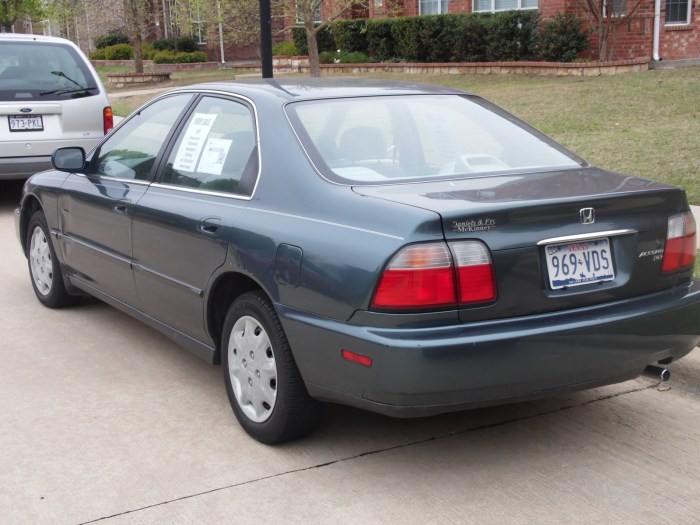
The 1997 Honda Accord was known for its balance of performance, fuel efficiency, and handling, making it a popular choice for drivers seeking a reliable and enjoyable driving experience.
Engine Options and Performance
The 1997 Honda Accord offered a range of engine options to cater to different needs and preferences.
- The base model came equipped with a 2.3-liter four-cylinder engine producing 130 horsepower and 140 lb-ft of torque. This engine provided adequate power for daily driving and commuting, offering a balance of fuel efficiency and performance.
- For those seeking more power, a 3.0-liter V6 engine was available, generating 190 horsepower and 195 lb-ft of torque. This engine delivered a more spirited driving experience, making the Accord a capable performer on the open road.
Fuel Efficiency and Emissions Standards
Fuel efficiency was a key consideration for the 1997 Honda Accord. The 2.3-liter four-cylinder engine achieved an EPA-estimated fuel economy of 24 mpg city and 31 mpg highway. The V6 engine, while offering more power, had a slightly lower fuel economy rating of 20 mpg city and 27 mpg highway.
The 1997 Honda Accord met the stringent emissions standards of the time, contributing to cleaner air quality.
The 1997 Honda Accord was a reliable and popular choice, known for its comfortable ride and spacious interior. If you’re looking for a slightly newer model with updated features, you might consider the 1999 Honda Accord. While the 1997 model holds its own in terms of dependability, the 1999 model offers some modern upgrades, like a more refined engine and enhanced safety features.
Handling and Ride Quality
The 1997 Honda Accord was praised for its responsive handling and comfortable ride quality. Its well-tuned suspension provided a balance of stability and comfort, making it enjoyable to drive both in city traffic and on winding roads.
The Accord’s precise steering and responsive brakes contributed to its overall handling prowess.
Interior and Comfort
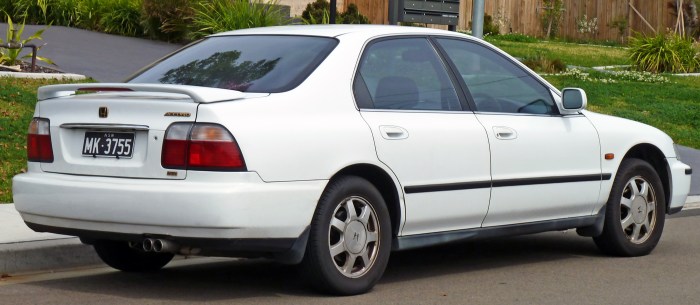
The 1997 Honda Accord boasts a spacious and comfortable interior that prioritizes practicality and driver-centric design. Its cabin provides a pleasant and functional environment for both passengers and the driver, with thoughtful features that enhance the overall driving experience.
Interior Design and Layout
The interior design of the 1997 Honda Accord emphasizes functionality and simplicity. The dashboard is well-organized, with clear instrumentation and easy-to-use controls. The layout is designed to minimize distractions and allow for a comfortable and intuitive driving experience. The use of high-quality materials throughout the cabin contributes to a sense of durability and refinement.
Comfort Features and Amenities
The 1997 Honda Accord offers a range of comfort features that enhance the driving experience. These features include:
- Comfortable Seats:The seats are designed for comfort and support, with ample legroom and headroom for both front and rear passengers. The driver’s seat is adjustable for height and lumbar support, allowing for a personalized driving position.
- Climate Control:The 1997 Accord features a standard air conditioning system, ensuring a comfortable cabin temperature even in hot weather. Some models may also include optional automatic climate control for enhanced comfort.
- Sound System:The standard audio system offers a clear and enjoyable listening experience, with AM/FM radio and a cassette player. Higher trim levels may include a CD player or an optional premium sound system.
- Power Accessories:The 1997 Accord comes standard with power windows, power locks, and power mirrors, adding convenience to everyday driving.
Cargo Space and Practicality
The 1997 Honda Accord offers ample cargo space for a mid-size sedan. The trunk is spacious and well-shaped, making it easy to load and unload luggage or other items. The rear seats can also be folded down to increase cargo capacity for larger items.
The Accord’s practicality is further enhanced by its numerous storage compartments throughout the cabin, providing convenient places to store personal items.
The 1997 Honda Accord is a classic example of reliable Japanese engineering, known for its spacious interior and comfortable ride. If you’re looking for something a bit smaller and sportier, consider the 1994 Honda Civic , another Honda icon known for its fuel efficiency and handling.
Both models are great choices for those seeking a reliable and affordable vehicle, offering different styles and features to suit your needs.
Reliability and Safety
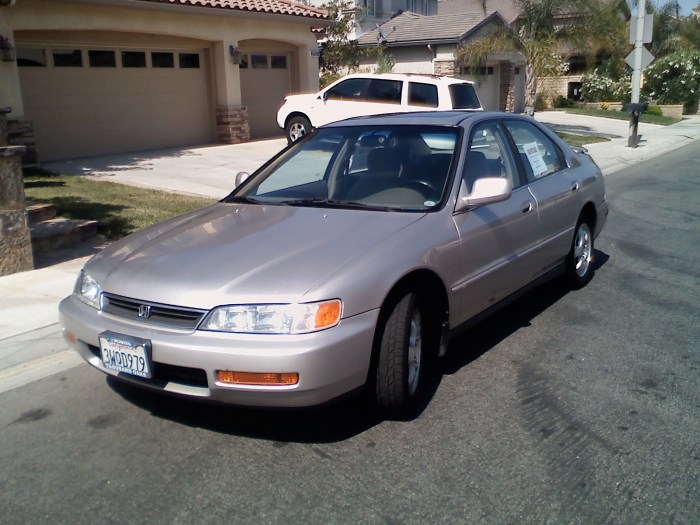
The 1997 Honda Accord is renowned for its reliability and safety, making it a popular choice among used car buyers. Its reputation for durability and long-lasting performance is a testament to Honda’s engineering prowess.
Reliability History
The 1997 Honda Accord is known for its reliability, and this is reflected in its consistent performance in various reliability surveys. For example, Consumer Reports, a well-respected consumer advocacy organization, has consistently ranked the 1997 Accord as one of the most reliable vehicles in its class.
- The Accord’s engine is known for its durability, often lasting well over 200,000 miles with proper maintenance.
- The transmission is also known for its longevity, with many Accords experiencing minimal issues even after years of use.
- The suspension system is generally robust and can handle the rigors of daily driving without significant problems.
Common Issues
While the 1997 Honda Accord is generally reliable, some common issues may arise over time.
- The air conditioning system may experience problems with the compressor or refrigerant leaks, especially in older models.
- The power steering pump can fail, resulting in a loss of steering assistance.
- The timing belt, a crucial component for engine timing, should be replaced every 100,000 miles to prevent catastrophic engine damage.
Safety Features
The 1997 Honda Accord came equipped with several safety features that were considered advanced for its time.
- Dual front airbags were standard, offering protection in the event of a frontal collision.
- Anti-lock brakes (ABS) were available on some models, helping to prevent wheel lockup during braking.
- The Accord’s rigid body structure was designed to absorb impact energy and protect occupants during a crash.
Safety Ratings
The 1997 Honda Accord received positive safety ratings from the National Highway Traffic Safety Administration (NHTSA) and the Insurance Institute for Highway Safety (IIHS).
- The NHTSA gave the Accord a four-star rating for frontal impact protection and a five-star rating for side impact protection.
- The IIHS awarded the Accord a “Good” rating in its frontal offset crash test, indicating good protection for occupants.
Safety Record Compared to Competitors
The 1997 Honda Accord’s safety record was generally on par with its competitors, such as the Toyota Camry and the Ford Taurus. However, the Accord’s reputation for reliability and its consistent performance in safety tests contributed to its popularity as a safe and dependable vehicle.
Ownership and Maintenance
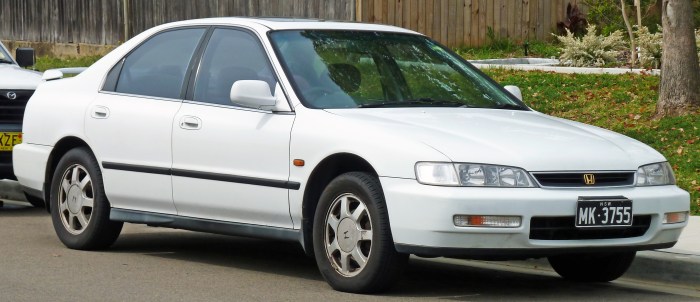
The 1997 Honda Accord is known for its reliability and affordability, making it a popular choice for used car buyers. However, owning and maintaining any car comes with costs, and understanding these costs is crucial for making an informed decision.
The 1997 Honda Accord was a reliable and popular choice, known for its spacious interior and comfortable ride. If you’re looking for a slightly smaller and more fuel-efficient option, consider the 2002 Honda Civic , which offered similar Honda reliability in a more compact package.
While the Accord was a great family car, the Civic provided a more nimble driving experience, making it a popular choice for city dwellers and those seeking better fuel economy.
This section will delve into the ownership and maintenance aspects of the 1997 Honda Accord, covering fuel consumption, insurance premiums, repair expenses, and routine maintenance schedules.
Cost of Ownership
The cost of owning a 1997 Honda Accord varies depending on factors such as location, driving habits, and the car’s condition. However, some general estimates can help you understand the financial implications of owning this vehicle.
Fuel Economy
The 1997 Honda Accord offers decent fuel economy, with an average combined fuel economy of around 25 miles per gallon (mpg).
- City driving: 21 mpg
- Highway driving: 29 mpg
These figures can fluctuate based on driving conditions, such as traffic and weather.
Insurance Costs
Insurance premiums for a 1997 Honda Accord are generally lower than those for newer models, mainly due to its age and lower resale value.
- Factors that influence insurance costs include your driving history, location, and the coverage you choose.
- You can obtain insurance quotes from various providers to compare prices and find the best deal.
Repair Expenses
While the 1997 Honda Accord is known for its reliability, occasional repairs are inevitable.
- Common repairs include replacing worn-out brake pads, tires, and belts.
- Major repairs, such as engine or transmission issues, are less frequent but can be costly.
It’s crucial to budget for unexpected repairs, especially as the car ages.
Maintenance Schedule
Regular maintenance is essential for keeping your 1997 Honda Accord in good condition and extending its lifespan.
- Refer to the owner’s manual for the recommended maintenance schedule.
- Common service requirements include oil changes, tire rotations, and fluid checks.
Oil Changes
Oil changes are crucial for engine lubrication and performance.
- The recommended oil change interval for the 1997 Honda Accord is every 3,000 miles or 3 months, whichever comes first.
- Using the correct type and grade of oil is essential for optimal engine performance.
Tire Rotations
Tire rotations help ensure even wear and tear across all tires.
- The recommended tire rotation interval is every 5,000 miles or 6 months, whichever comes first.
- Rotating tires helps prevent uneven wear and tear, extending their lifespan.
Fluid Checks
Regularly checking fluid levels is vital for proper vehicle operation.
- Check the coolant, brake fluid, power steering fluid, and transmission fluid levels.
- Top off fluids as needed to ensure optimal performance.
Finding Parts and Resources
Maintaining a 1997 Honda Accord is relatively easy, thanks to the abundance of parts and resources available.
Parts
You can find parts for the 1997 Honda Accord at various sources:
- Dealerships: Offer genuine Honda parts, but they may be more expensive.
- Online retailers: Provide a wide selection of parts at competitive prices.
- Local auto parts stores: Offer a convenient option for purchasing parts.
Resources
Several online resources can help you with maintaining your 1997 Honda Accord:
- Owner’s manual: Provides detailed information on maintenance schedules, troubleshooting tips, and repair procedures.
- Online forums: Connect with other Honda Accord owners and share information and experiences.
- Repair manuals: Offer in-depth guides on repairing various components of the car.
Cultural Impact
The 1997 Honda Accord, a symbol of reliability and practicality, transcended its status as a mere car and became deeply embedded in popular culture. Its influence resonated across various aspects of society, leaving an enduring mark on automotive design and trends, and shaping the perception of cars in the late 20th century.
Impact on Automotive Design and Trends
The 1997 Honda Accord’s success played a pivotal role in shaping automotive design trends, particularly in the mid-size sedan segment. Its aerodynamic styling, spacious interior, and focus on fuel efficiency became benchmarks for other manufacturers.
- Aerodynamic Styling:The Accord’s sleek, rounded design, inspired by the then-popular “jellybean” aesthetic, became a defining characteristic of the era. This design philosophy emphasized smooth curves and a low drag coefficient, contributing to improved fuel economy and a more modern look.
- Spacious Interior:The Accord’s spacious cabin, with its well-designed ergonomics and comfortable seating, set a new standard for passenger comfort in the mid-size segment. This focus on interior space and comfort resonated with buyers seeking a practical and luxurious driving experience.
- Fuel Efficiency:The Accord’s fuel-efficient engine, coupled with its aerodynamic design, made it a leader in its class. This emphasis on fuel economy became increasingly important as consumers became more conscious of environmental impact and rising fuel prices.
Comparison to Modern Vehicles
The 1997 Honda Accord, a classic of its time, stands in stark contrast to modern mid-size sedans. While it offered reliable transportation and a comfortable ride, today’s vehicles boast advanced technologies, enhanced safety features, and significantly improved performance.
Technological Advancements
The automotive landscape has undergone a dramatic transformation since the 1997 Accord’s release. Modern vehicles are packed with technology that was unimaginable in the 1990s.
- Infotainment Systems:Modern Accords feature touchscreen infotainment systems with Apple CarPlay and Android Auto integration, offering seamless smartphone connectivity, navigation, and entertainment options. In contrast, the 1997 model had a basic radio and cassette player.
- Driver Assistance Systems:Advanced driver-assistance systems (ADAS) are now commonplace, including adaptive cruise control, lane departure warning, blind spot monitoring, and automatic emergency braking. The 1997 Accord lacked these features, relying solely on the driver’s vigilance.
- Connectivity:Modern vehicles are connected to the internet, allowing for real-time traffic updates, remote vehicle control, and over-the-air software updates. The 1997 Accord had no such connectivity, limiting its functionality to the physical controls within the car.
Safety Features
Modern mid-size sedans offer a significantly higher level of safety compared to the 1997 Accord.
- Airbags:While the 1997 Accord had front airbags, modern vehicles feature multiple airbags, including side, curtain, and knee airbags, providing comprehensive protection in the event of a collision.
- Electronic Stability Control (ESC):ESC is now standard in most vehicles, helping prevent loss of control during slippery conditions. The 1997 Accord lacked ESC, making it more susceptible to skidding and rollovers.
- Collision Avoidance Systems:Modern vehicles are equipped with advanced collision avoidance systems, such as automatic emergency braking and lane departure warning, which can help prevent or mitigate accidents. The 1997 Accord lacked these crucial safety features.
Performance and Fuel Efficiency, 1997 Honda Accord
Modern mid-size sedans offer significantly improved performance and fuel efficiency compared to the 1997 Accord.
- Engine Technology:Modern engines are more powerful, fuel-efficient, and cleaner than their 1990s counterparts. Advancements in engine design, including direct injection and turbocharging, have resulted in increased horsepower and torque while reducing fuel consumption.
- Transmission Technology:Modern vehicles feature advanced transmissions, such as continuously variable transmissions (CVTs) and dual-clutch transmissions (DCTs), which provide smoother shifts and improved fuel economy. The 1997 Accord had a conventional automatic transmission, which was less efficient and responsive.
- Aerodynamics:Modern vehicles are designed with improved aerodynamics, which reduces drag and improves fuel efficiency. The 1997 Accord, while aerodynamic for its time, pales in comparison to modern designs.
Value and Desirability
While the 1997 Honda Accord is a reliable and comfortable vehicle, its lack of modern technology and safety features makes it less desirable compared to contemporary mid-size sedans.
- Resale Value:The 1997 Accord’s resale value is significantly lower than that of modern vehicles. This is due to its age, lack of modern features, and the availability of newer, more technologically advanced options.
- Desirability:While the 1997 Accord was a popular car in its day, its lack of modern amenities and safety features makes it less appealing to today’s buyers. Modern vehicles offer a more comprehensive package of features, technology, and safety, making them more desirable to consumers.
- Maintenance Costs:While the 1997 Accord is known for its reliability, its age may lead to higher maintenance costs as parts become harder to find and more expensive. Modern vehicles often have longer service intervals and require less frequent maintenance, reducing overall ownership costs.
Summary
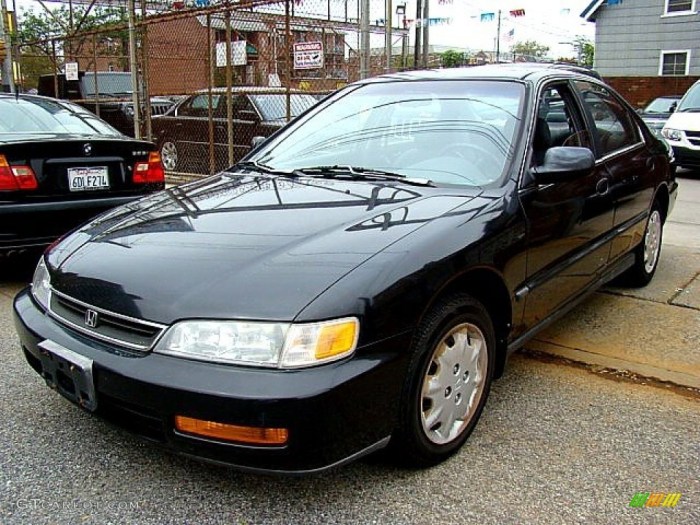
The 1997 Honda Accord stands as a testament to Honda’s commitment to building vehicles that are both reliable and enjoyable to drive. It’s a car that embodies the spirit of its era, offering a practical and comfortable driving experience without compromising on performance or fuel efficiency.
While modern vehicles have undoubtedly surpassed the 1997 Accord in terms of technology and safety features, its enduring appeal speaks volumes about its timeless design and enduring quality. For those seeking a classic sedan with a proven track record, the 1997 Honda Accord remains a compelling choice, offering a reliable and enjoyable driving experience for years to come.